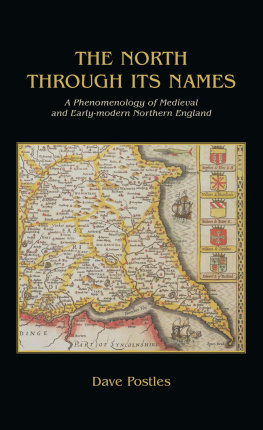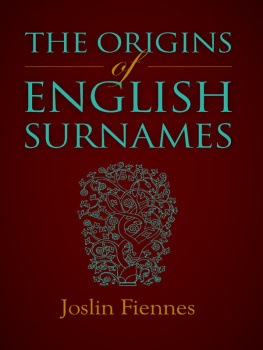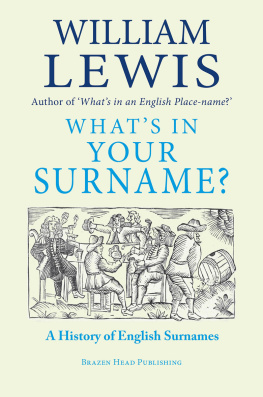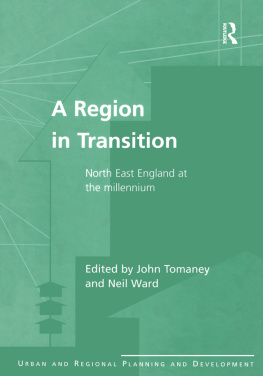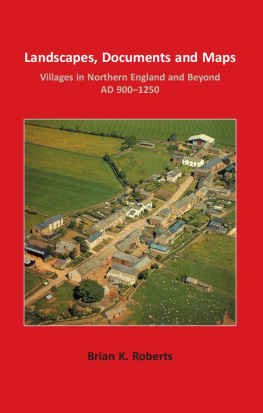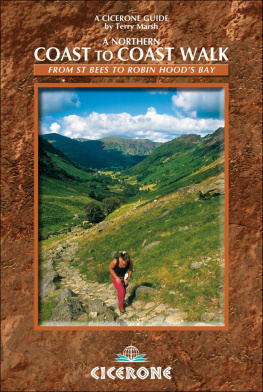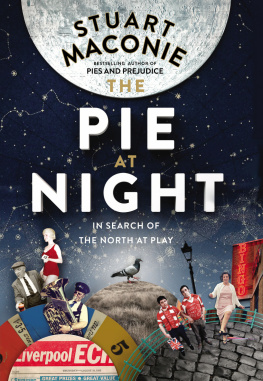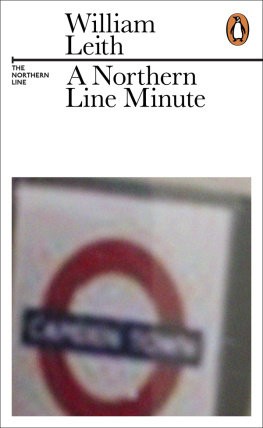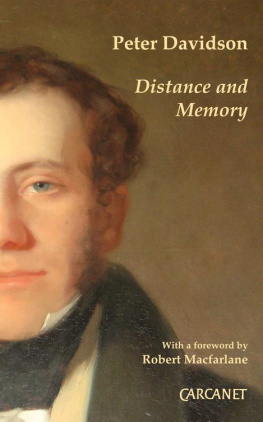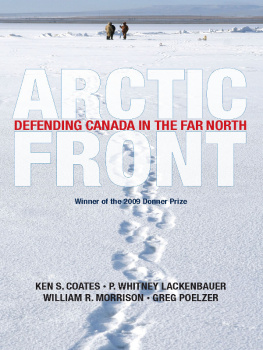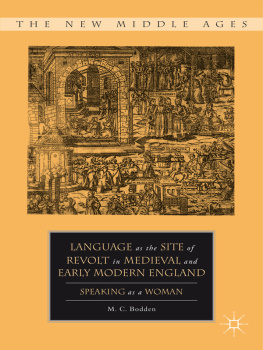
The North through its Names
A Phenomenology of Medieval and Early-modern Northern England
Dave Postles
Marc Fitch Research Fellow,
University of Leicester
English Surnames Survey
Volume 8
Oxbow Books
First published in the United Kingdom in 2007. Reprinted in 2018 by
OXBOW BOOKS
The Old Music Hall, 106108 Cowley Road, Oxford OX4 1JE
and in the United States by
OXBOW BOOKS
1950 Lawrence Road, Havertown, PA 19083
Oxbow Books and the author 2007
Paperback Edition: ISBN 978-1-78570-979-1
Digital Edition: ISBN 978-1-78297-549-6
Kindle Edition: Mobi ISBN: 978-1-78297-550-2
A CIP record for this book is available from the British Library
All rights reserved. No part of this book may be reproduced or transmitted in any form or by any means, electronic or mechanical including photocopying, recording or by any information storage and retrieval system, without permission from the publisher in writing.
For a complete list of Oxbow titles, please contact:
| UNITED KINGDOM | UNITED STATES OF AMERICA |
| Oxbow Books | Oxbow Books |
| Telephone (01865) 241249, Fax (01865) 794449 | Telephone (800) 791-9354, Fax (610) 853-9146 |
| Email: | Email: |
| www.oxbowbooks.com | www.casemateacademic.com/oxbow |
Oxbow Books is part of the Casemate Group
Blessed are your north parts, for all this long time
My sun is with you, cold and dark is our clime;
Heavens sun, which stayed so long from us this year,
Stayed in your north (I think) for she was there,
And hither by kind nature drawn from thence,
Here rages, chafes and threatens pestilence;
Yet I, as long as she from hence doth stay,
Think this no south, no summer, nor no day.
[John Donne, To Mr I. L.
A. J. Smith, ed., John Donne. The Complete English Poems
(Harmondsworth, 1996 edn), p. 203]
A CKNOWLEDGEMENTS AND C OMMENT
With this volume the English Surnames Survey embarks upon both a new departure and a move to its dissolution. When the ESS was inaugurated in the middle of the 1960s, the objective was optimistically established of proceeding county by county towards a conglomerate picture of English surname patterns. By the late 1980s it became evident that that ambition could not be realized. It was determined then to move at some future stage to a higher level of organization through a regional approach. In fact, it had long been realized that the county provided no more than an artificial administrative structure for research into surnames it had been selected as a heuristic device because so much of the data had been collected at that level of administration, principally records of taxation (however exclusive those might be). Attempting a regional approach allows the data to define the zones, sub-regions, localities and boundaries in a less predetermined manner. Without the previous research into Lancashire and the West Riding of Yorkshire, however, the project would not have been as inviting. To a large degree, the selection of a northern region was influenced by those prior elucidations of two large areas within a northern onomastic zone. Although this consideration of the North has been informed by this previous literature from the English Surnames Survey, to a large extent the discussion here starts ab initio for two reasons: to avoid too much repetition; and to allow a more cohesive and holistic account rather than commencing with the two regions explored and building from them.
Nor, however, would the North have been so comprehensible without the creative interpretations of Charles Phythian-Adams. present volume. I would, too, have been a poorer medievalist without the acquaintance of Paul Hyams and Steve White, but I do not hold them responsible for my remaining, considerable shortcomings, although in many ways have I tried to emulate them.
In the context of expanding my understanding of the medieval and early-modern contexts of naming, I have incurred another immense debt to Drs David Gentilcore, Ian Harris and Michael Davies, for their stimulating Early Modern Seminar series, enlivened by so many fabulous speakers. For the impact of ideas about social history, I am delighted to acknowledge the stimulus of Paul Griffiths and Andy Wood if from afar. In that same context, I am much indebted to Professor Eric Dunning for conversations about social interactionism and interdependency index as well as other sociological notions.
My work for the Marc Fitch Fund would have collapsed many years ago had it not been for the motivation and encouragement of Roy Stephens, erstwhile Executive Secretary to the Fund who also gently directed me through the processes of book publication. My acknowledgement to him is sincere. When Richard Smith was closely involved with the work of the English Surnames Survey, he was not only supportive, but a researcher whom one could (vainly) aspire to imitate. That responsibility has been assumed in more recent years by Jenny Kermode.
For the maintenance of spiritual wellbeing, a large debt of gratitude is owed to Audrey, Catherine, Charlotte, Jackie, Jean, Odette, Peter, Rose and Sue in the SCR for their kindness. Audrey Larriv continues to be a star.
This book is dedicated, nonetheless, emotionally to Suella, Fred and Mercury.
Dave Postles
July 2004
Place, then, as a social site related to other positions and social localities and known as a locality in which experience, memory and feeling are constituted, is critical to understanding being-in-the-world. And Merleau-Pontys phenomenology of the lived-body allows us to understand how place is experienced through the founding of sense by human communities.
(Simon Charlesworth, A Phenomenology of Working Class Experience (Cambridge, 2000), p. 19. Thank you, Simon, for the understanding and a lovely book).
Notes
G. Redmonds, Yorkshire, West Riding (English Surnames Survey 1, Chichester, 1973); R. A. McKinley, The Surnames of Lancashire (ESS 4, Oxford, 1981).
More particularly, but not exclusively, Land of the Cumbrians: a Study in British Provincial Origins, A.D. 4001120 (Aldershot, 1996).
E DITORIAL C ONVENTIONS
Before 1350 simply and only as a rule of thumb and in other cases where it is probable that the second qualifying name had not become hereditary (a surname) bynames ( cognomina ) are given in italic. For the most part, the terms established by the English Surnames Survey have been used here; where the text deviates from that usage, it is to adopt some more precise terms propagated by continental researchers. Dates are given in New Style.
Notes
M. Bourin, ed., Gense Mdivale de LAnthroponymie Moderne: tudes dAnthroponymie Mdivale (Tours, 1989) and subsequent volumes.
A BBREVIATIONS
| Bedfordshire 1297 | A. T. Gaydon, ed., The Taxation of 1297: a Translation of the Local Rolls of Assessment for Barford, Biggleswade, and Flitt Hundreds, and for Bedford, Dunstable, Leighton Buzzard and Luton (Bedfordshire Historical Record Society 39, 1959) |
| Bishop Hatfields Survey | W. Greenwell, ed., Bishop Hatfields Survey: a Record of the Possessions of the See of Durham, Made by Order of Thomas de Hatfield, Bishop of Durham, with an Appendix of Original Documents and a Glossary (Surtees Society 32, 1857) |
| BL | British Library, London |
| Bodl. | Bodleian Library, Oxford |
| Buckinghamshire | A. C. Chibnall, ed., Early Taxation Returns: Taxation of Personal Property in 1332 and Later (Buckinghamshire Record Society 14, 1966) |
Next page
